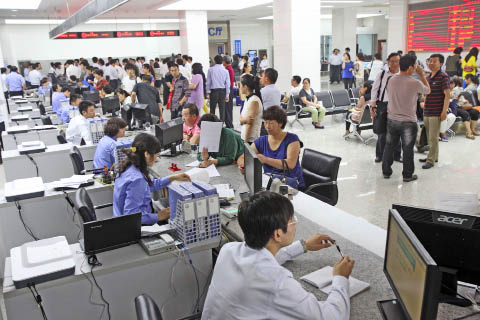Deepening Administrative Reform to Promote Economic and Social Development
By WANG MANCHUAN
Since the 18th National Congress of the Communist Party of China (CPC) and the Third Plenary Session of the 18th CPC Central Committee, the new central leadership has been drawing on past experiences and achievements to put forward a series of actions to deepen administrative reform. The measures, which have been regarded as a breakthrough in government-market relations, include the proper handling of relations between the two entities and letting the market play a decisive role in resource allocation to effectively promote economic and social progress under new circumstances.
|
 |
|
The Administrative Examination and Approval Bureau of Tianjin Binhai New Area, established on May 20, 2014. |
Streamlining Administration and Delegating Powers
The new central leadership soon realized that the transformation of government functions could only work with the reform of the administrative approval system. Consequently they began to delegate powers to the market and to local governments.
A slew of items previously subject to administrative examination and approval were canceled or delegated to authorities at lower levels. By September 2014, the State Council had successively revoked or reallocated 632 administrative approval items in seven batches. The Chinese government also revised a key investment approval catalog, which includes a list of investment projects open to foreign capital, expanding market access to foreign investors. Meanwhile the central government cut the number of items of special transfer payments, increased those for general transfer payments, and passed certain special transfer payments items to local governments.
What’s more, the business registration system has been reformed to lower the bar for entrepreneurship by removing the minimum registered capital requirement, changing the system of paid-in capital to one of subscribed capital, and replacing annual enterprise inspection with public disclosure of annual corporate reports. The government also loosened registration conditions for business premises: for more than 100 items where administrative approval was formerly a prerequisite for business registration, the procedures can now wait until a company gets its license. These efforts by the government to eliminate market barriers have made resource allocation more efficient and equal.
Moreover, the reform of the social organization management system repealed the dual registration system imposed on industry associations, sci & tech, charity and community service organizations. Approval from the supervisory body of relevant sectors is no longer needed; instead, these social organizations can directly apply to the civil affairs department for registration.
With the decentralization of power, the Chinese government has transformed its functions. First, local governments are gearing up to undertake functions transferred by the central government. Local governments will then sort out and delegate a batch of administrative approval items to lower-level authorities.
